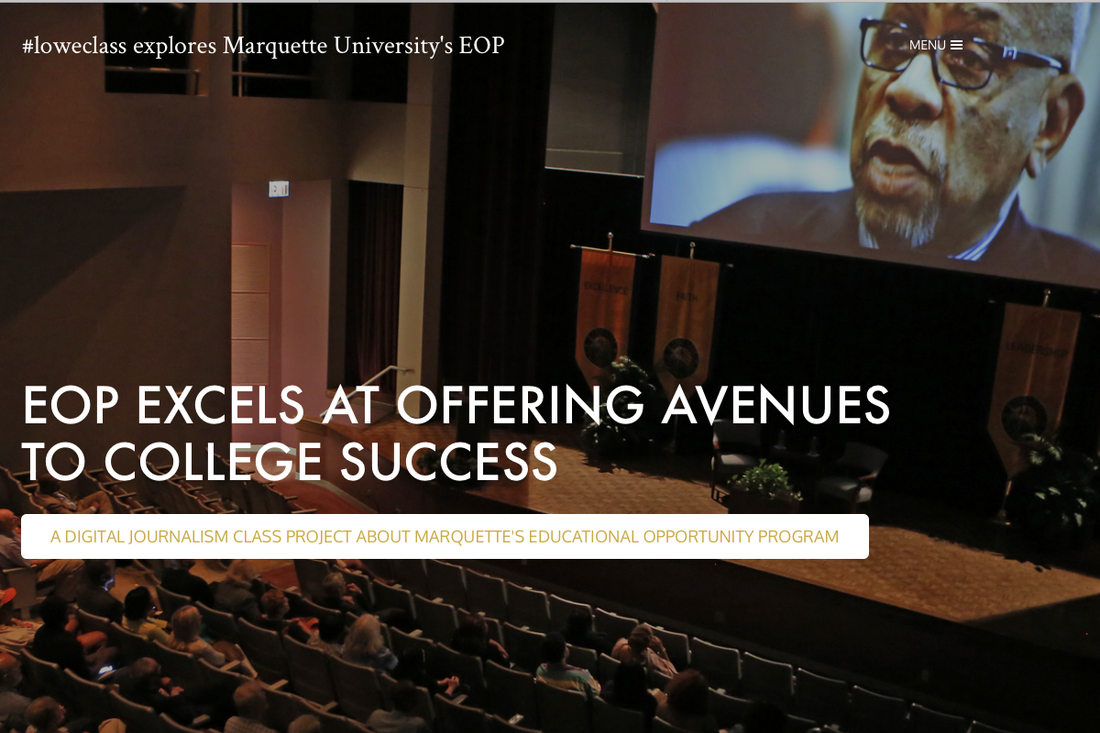As a proud Marquette and EOP graduate, I left that EAA meeting eager to help Green and others tell the program's story and those of its nearly 2,000 graduates. As a new faculty member, the possibilities for student journalists to contribute were obvious. Four years later, EOP's 45th anniversary celebration coincided nicely with my desire for a worthwhile final project for my Digital Journalism III (JOUR 2100) class.
Also known as #loweclass, my 14 students plus one joining us via an independent study readily took to the idea, as junior Natalie Ragusin shares in an introduction that includes excerpts from blog posts written after all but a couple learned that EOP existed. Several of them later attended a symposium focusing on events that caused Marquette to start EOP in 1969. Junior Henry Greening recounts the symposium using excerpts from blog posts written afterward.
Elizabeth Baker offers a story about EOP founding director Arnold Mitchem, Ph.D., considering his life's work, after the junior reviewed a DVD of my half-hour interview with him after Marquette premiered a documentary about the program during alumni reunion weekend in July. Junior Madeline Kennedy and senior Robyn St. John worked together to create a photo gallery featuring the best from among scores of images taken at EOP events during that weekend.
Teaching students to use video as journalists is one of JOUR 2100's primary goals. Sophomore Brittany Carloni and seniors Thomas Conroy and Madeline Pieschel produced a video about the tutoring service EOP provides for undergraduates. Juniors Jenna Ebbers, Estefania Ebbers and Caroline Roers offer one about the program moving its offices to elsewhere on campus. After most of the class had reviewed unused footage from the before-mentioned documentary, Baker, Greening and Ragusin teamed with juniors DeWayne Gage and Teran Powell to present personal reflections from six people linked to EOP.
This final project also includes interactive storytelling and basic data visualization. Sophomore Devi Shastri and Junior Roque Redondo (with copyediting by Baker) developed a timeline that reviews EOP's history and efforts in Milwaukee and nationally to provide better higher education opportunities for students of color. Several of the students also joined to create illustrations based on program-related data provided by EOP officials and discovered using other sources.
#loweclass considered lots of options for sharing all of this work. We hope it will soon find its way onto Marquette's website alongside existing content showcasing EOP. For now, my thanks to Kennedy and Pieschel for coming into my office on a Sunday afternoon to help me fashion this site a day before Greene and others examined it during our final exam period.
"It's incredibly impressive," EOP Administrative Coordinator Claire Dinkelman, our main contact for both securing data and access to her colleagues, told the class. "It's so comprehensive. It's not just a film. It's all these other little pieces together."
University Archivist Michelle Sweetser, who worked with Shastri to locate material for the timeline, brought along others from Raynor Memorial Libraries for the unveiling. “It’s really great to see the work that you have put together," she said, adding "you have created a new entry, basically, in the scholarly world ... about the EOP program. You’ve created this great resource."
Green also congratulated #loweclass for its efforts. "This is fabulous. I want to thank you all ... for this work – and I really believe (that) this is going to be really impactful nationwide in terms of capturing what we do in TRIO (the set of federally funded college opportunity programs begun during President Lyndon Johnson's War on Poverty in the 1960s)."
The director added: "I can envision this being (available to) people like myself who are interested in TRIO, or people who are just interested in working with first-generation, low-income, underrepresented students. They will hear this story in a way in which you all have laid it out. So I can imagine years from now this will continue to go on and inform people. So you should be really proud of this work ... because I can see how it will really help move not just EOP and Marquette forward, but just this kind of movement forward – the TRIO movement forward – the way in which you captured this.”
My sentiments would echo what Green, Sweetser and Dinkelman said. So let me end with a new #loweclass signature from this semester: #soproud.
Thankful to @herbertlowe and my fellow members of #loweclass for a semester of great #journalism experiences.
— Brittany Carloni (@CarloniBrittany) December 9, 2014 Well #loweclass it has been a treat working with you all! So proud of the work we did this semester
— Robyn St. John (@RobynJStJohn) December 9, 2014 I bet the 17 #loweclass students for next semester won't have a final project attached to the word "legacy." #AcceptTheChallenge
— Jenna Ebbers (@jenna_ebbers) December 9, 2014 
 RSS Feed
RSS Feed
